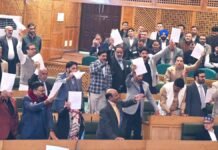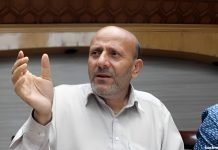On 23 November 2006, the national media reported that the special cell of Delhi Police had arrested two Laskhar-e-Toiba terrorists from Dwarka in south-west Delhi.
The man arrested was 25-year-old Imran Ahmed Kirmani who had done a three-year course in aircraft maintenance from Jaipur and was looking for a job here in Delhi. Police said that he was caught handing over 4.5 lakh rupees in cash to Ghulam Rasool Bafanda (45), a resident of Baramulla. “Both men allegedly worked for LeT divisional commander Furkan. The men were arrested on 16 November from sector 6 main market in Dwarka. Apart from the cash, 1.65 kg RDX and two ABCD timers were seized from them,” police claimed.
Soon after the arrest, the media was abuzz with headlines such as: “LeT man with aircraft care training held” (Times of India, November, 23, 2006), “RDX seized in Delhi; two arrested” (The Hindu), “Two Kashmiris arrested in Delhi, suspected Lashkar militants” (Indo-Asian News Service), and many other such headlines.
Five years later, Imran was back in the news again. This time the headlines were very different: “Innocent Kashmiri acquitted after 5 yrs”, “Held for ‘9/11-type’ plot, no case 4 years later” and “Delhi court exonerates Kashmiri engineer 5 years after his arrest”.
Imran’s case raises an important question: Is a ‘suspected’ terrorist the same as a terrorist? And does the media know the difference between the two?
These questions are timely because those ‘suspected terrorists’ are making headlines again. On Wednesday, the police claimed they have arrested two LeT militants who were planning attacks in Delhi. The next day newspapers dutifully reported the same: “Delhi averts terror, 2 LeT men arrested”, “Major terror bid foiled in Delhi; 2 Lashkar men arrested”, etc.
Last October, the Sunday Guardian reported that in response to an RTI application, the Delhi police admitted that between 2005 and 2010 it had “wrongfully” arrested 47,545 individuals who were later acquitted by various courts.
The report also said that the maximum number of acquittals were in cases handled by the prestigious Special Cell. Between 2005 and 2010, the Special Cell arrested 174 people on various charges, but was able to convict only 55 of them. The South Delhi police had 9,910 convictions out of 13,946 arrests. The situation was worse in the Outer District, where there were more acquittals than convictions between 2005 and 2010.
“I am not surprised that 42 percent are not convicted. I am amazed that the Delhi police manage to get convictions for the remaining 58 percent. Its methods of investigation are outdated. In most cases, even forensic tests are not undertaken,” criminal lawyer Viraj Dattar told the Sunday Guardian.
But in a number of cases, it isn’t a matter of sloppy police work but extreme bad faith.
When I met Imran in Kashmir earlier this year, he gave me a far more chilling version of his arrest. According to him, he was first picked up at his apartment in Dwarka that day and then the police created an “arrest drama” in a shopping mall. “I was brought in one vehicle and the police brought another Kashmiri and told him to run with a bag. As he ran away, police ran after him and shouted ‘Pakdo, pakdo’ (catch, catch). It was all just to show that he was running and police arrested him on spot,” says Imran.
This is not first time that a Kashmiri has been arrested on mere suspicion. In 1996, Mohammad Maqbool Shah, a 15-year-old, left home for a fortnight-long vacation in Delhi. He returned home after 14 years spent in a jail as accused in the 1996 Lajpath Nagar blast case. He, along with other four Kashmiris, was acquitted by a Delhi Court.
“It is only years later, with the accused already having spent years in jail – his business destroyed, his children out of school, and in many cases, family members suffering from severe mental depression – that the truth starts to emerge. This is the terrible truth of illegal detention, torture, extortion and frame-ups,” writes Manisha Sethi of the Jamia Teachers’ Solidarity Association.
So next time you read the news, just remember: A suspected terrorist is just that. And a mere arrest is not evidence of guilt.
The man arrested was 25-year-old Imran Ahmed Kirmani who had done a three-year course in aircraft maintenance from Jaipur and was looking for a job here in Delhi. Police said that he was caught handing over 4.5 lakh rupees in cash to Ghulam Rasool Bafanda (45), a resident of Baramulla. “Both men allegedly worked for LeT divisional commander Furkan. The men were arrested on 16 November from sector 6 main market in Dwarka. Apart from the cash, 1.65 kg RDX and two ABCD timers were seized from them,” police claimed.
Soon after the arrest, the media was abuzz with headlines such as: “LeT man with aircraft care training held” (Times of India, November, 23, 2006), “RDX seized in Delhi; two arrested” (The Hindu), “Two Kashmiris arrested in Delhi, suspected Lashkar militants” (Indo-Asian News Service), and many other such headlines.
Five years later, Imran was back in the news again. This time the headlines were very different: “Innocent Kashmiri acquitted after 5 yrs”, “Held for ‘9/11-type’ plot, no case 4 years later” and “Delhi court exonerates Kashmiri engineer 5 years after his arrest”.
Imran’s case raises an important question: Is a ‘suspected’ terrorist the same as a terrorist? And does the media know the difference between the two?
These questions are timely because those ‘suspected terrorists’ are making headlines again. On Wednesday, the police claimed they have arrested two LeT militants who were planning attacks in Delhi. The next day newspapers dutifully reported the same: “Delhi averts terror, 2 LeT men arrested”, “Major terror bid foiled in Delhi; 2 Lashkar men arrested”, etc.
Last October, the Sunday Guardian reported that in response to an RTI application, the Delhi police admitted that between 2005 and 2010 it had “wrongfully” arrested 47,545 individuals who were later acquitted by various courts.
The report also said that the maximum number of acquittals were in cases handled by the prestigious Special Cell. Between 2005 and 2010, the Special Cell arrested 174 people on various charges, but was able to convict only 55 of them. The South Delhi police had 9,910 convictions out of 13,946 arrests. The situation was worse in the Outer District, where there were more acquittals than convictions between 2005 and 2010.
“I am not surprised that 42 percent are not convicted. I am amazed that the Delhi police manage to get convictions for the remaining 58 percent. Its methods of investigation are outdated. In most cases, even forensic tests are not undertaken,” criminal lawyer Viraj Dattar told the Sunday Guardian.
But in a number of cases, it isn’t a matter of sloppy police work but extreme bad faith.
When I met Imran in Kashmir earlier this year, he gave me a far more chilling version of his arrest. According to him, he was first picked up at his apartment in Dwarka that day and then the police created an “arrest drama” in a shopping mall. “I was brought in one vehicle and the police brought another Kashmiri and told him to run with a bag. As he ran away, police ran after him and shouted ‘Pakdo, pakdo’ (catch, catch). It was all just to show that he was running and police arrested him on spot,” says Imran.
This is not first time that a Kashmiri has been arrested on mere suspicion. In 1996, Mohammad Maqbool Shah, a 15-year-old, left home for a fortnight-long vacation in Delhi. He returned home after 14 years spent in a jail as accused in the 1996 Lajpath Nagar blast case. He, along with other four Kashmiris, was acquitted by a Delhi Court.
“It is only years later, with the accused already having spent years in jail – his business destroyed, his children out of school, and in many cases, family members suffering from severe mental depression – that the truth starts to emerge. This is the terrible truth of illegal detention, torture, extortion and frame-ups,” writes Manisha Sethi of the Jamia Teachers’ Solidarity Association.
So next time you read the news, just remember: A suspected terrorist is just that. And a mere arrest is not evidence of guilt.
Follow Us
The Kashmir Pulse is now on Google News. Subscribe our Telegram channel and Follow our WhatsApp channel for timely news updates!










